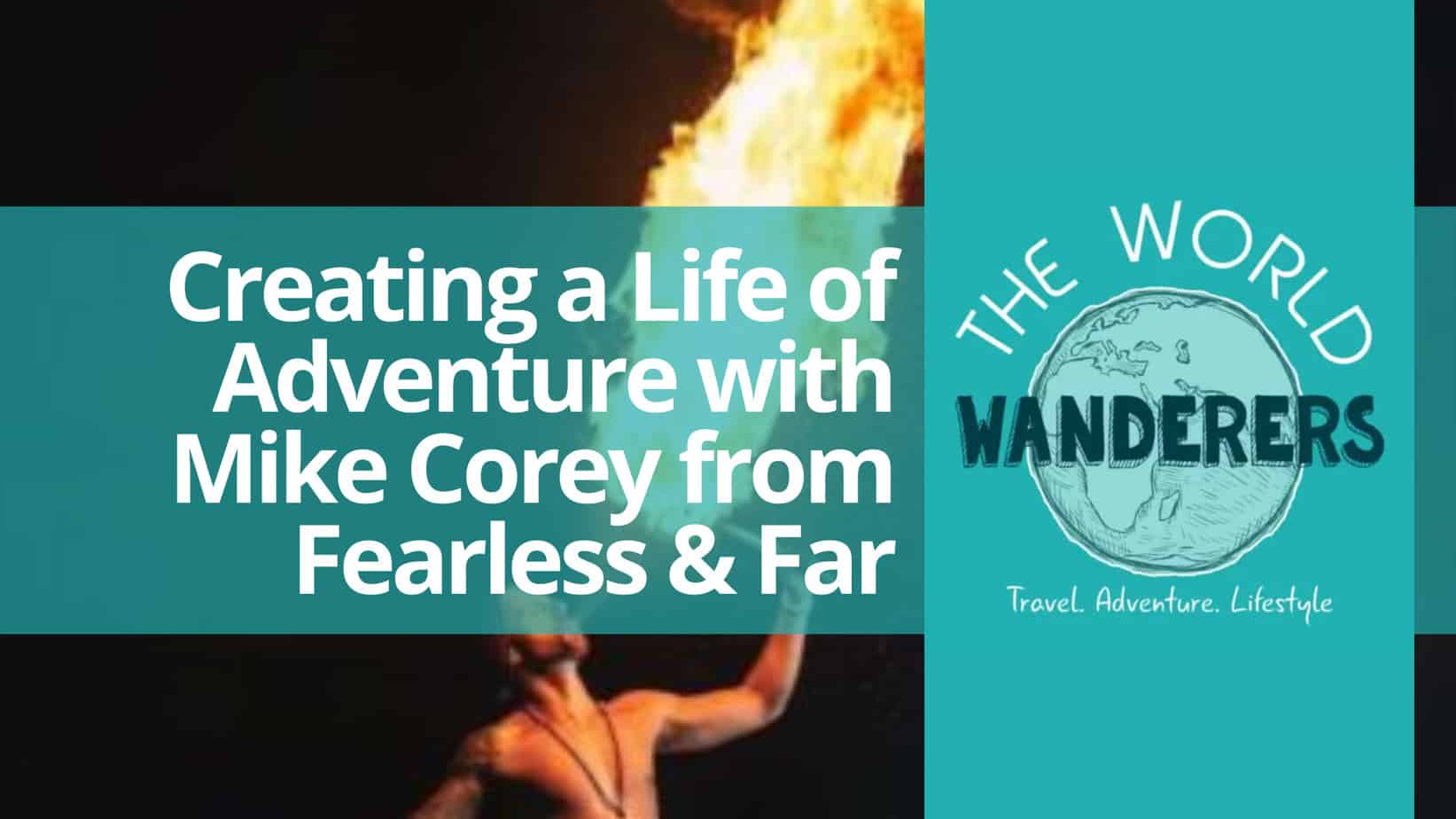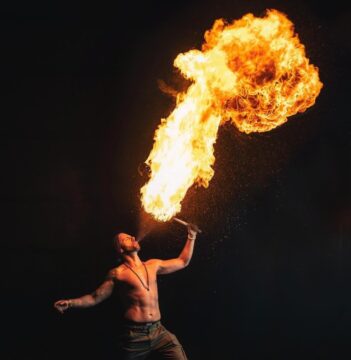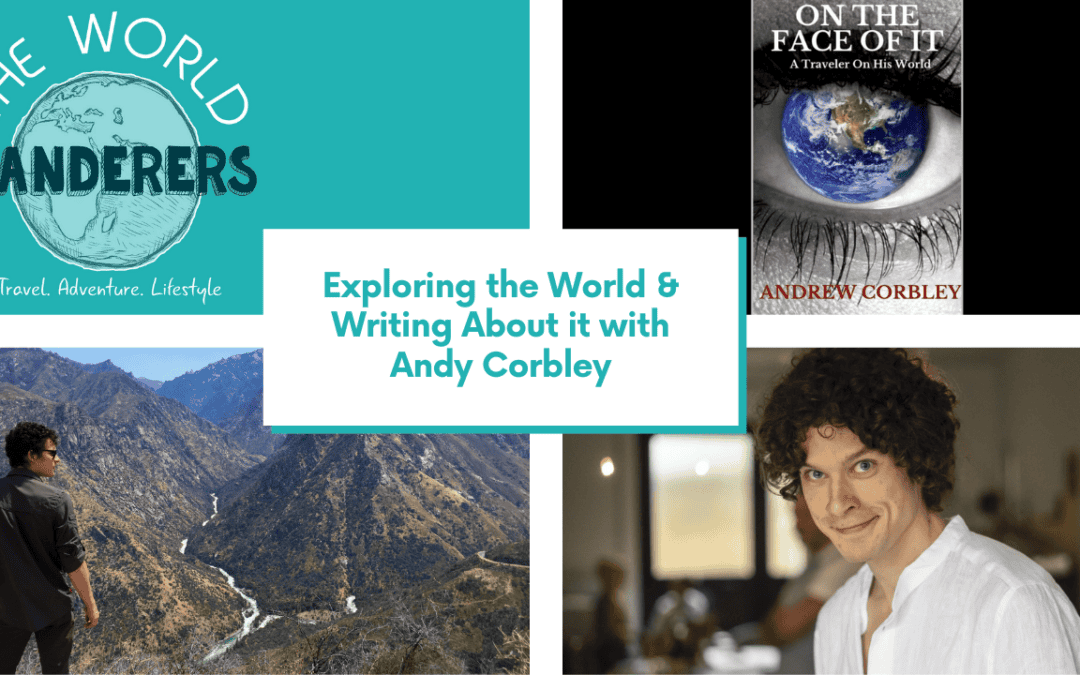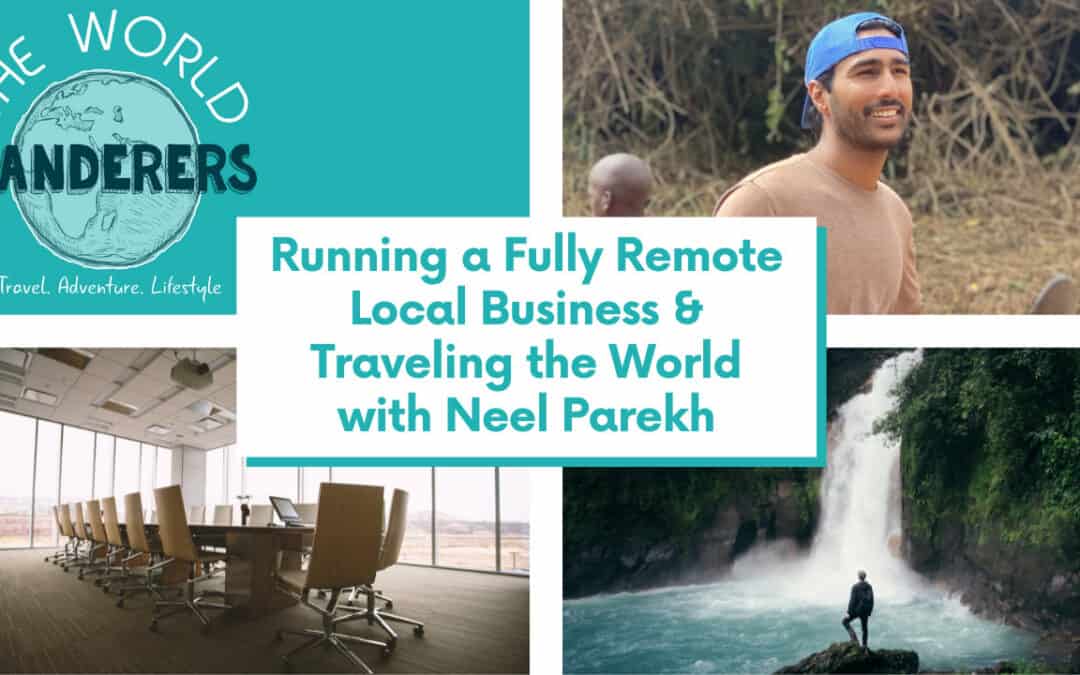Download Now or Listen on iTunes (or your favorite podcast app!)
On this episode of The World Wanderers, we get the chance to sit down with Mike Corey from Fearlessandfar.com!
Mike is an Adventure Travel YouTuber, BBC Television Host, Filmmaker, and Podcaster creating adventure travel content to inspire anyone to chase their fears.
Over the past couple of years, Mike has lived through and documented some incredible adventures, many of which you’ve just got to see (or hear) to believe.
Throughout this conversation, we discuss the mindset that it takes to chase your fears around the world, what responsible travel looks like during a pandemic, and why anyone would climb Mt. Kilamunjaru carrying a watermelon.
In this episode:
- Life in Tanzania
- Climbing Mt. Kilamunjaru carrying a watermelon
- What does responsible travel look like during a pandemic?
- Essential vs non-essential travel and business
- The impact of the global tourism shutdown
- Misunderstood places and challenging geographical stereotypes
- Debunking hand-me-down fears
- The universality of the human experience
- What is “too risky?”
If you would like to get access to the past and future episodes of our nomad series as a World Wanderers Insider, head on over to Patreon.com/theworldwanderers. Thank you so much for your continued support!
Connect with Mike Corey here:
Digital Nomad Life: Creating a Life of Adventure with Mike Corey from Fearless & Far
Welcome to the World Wanderers podcast, your source for travel stories, travel destinations, and travel philosophy. We are your hosts Ryan and Amanda, and we will be taking you on today’s adventure as we speak with this week’s guest.
In this episode, we are excited to share with you the fascinating story of Mike Corey. We enjoyed getting to know this adventurous traveler and YouTuber who had some very unusual experiences to share with us. Through his platforms, he shares adventure travel videos, pushing himself to the limits, which is what makes him stand out.
Recently he just launched his podcast, where he shares his incredible stories from all over the world. In addition, he had some fascinating and unusual destinations and experiences to share, which definitely would inspire everyone to chase their fears-as that is his primary goal.
Life in Tanzania
Mike joined us from Tanzania, and we were interested in what life is like there now due to the pandemic. He shared some interesting things about how the country denies that the virus exists, which changes how people live there.
“I arrived here at the very beginning of January, and no one had masks. I found out after a while that the president and the health minister, both declared that the COVID 19 does not exist in Tanzania. Life is just about back to normal here”-Mike.
But despite the whole chaos, he has been enjoying this place and the fantastic things it has to offer. He says the main reason he came here was to climb Kilimanjaro, and of course, he took this travel opportunity since he needs exploration and traveling to remain happy and healthy.
“I’m here because I had an invitation to climb Kilimanjaro. And for me, at least, I think as a traveler, your risk assessment changes a little bit. So me being a healthy young 35 year old, I have decided to continue traveling. And I had an opportunity to climb Kilimanjaro, and I said yes, partly because I need to travel to stay mentally healthy.” -Mike.
He describes the scenery of this beautiful place and how different it is when there are not many tourists and people around. It’s definitely something one should experience for themselves.
“Basically, that was the situation. We just got back a few days ago, and we were the only ones on the summit.” -Mike.
Climbing Mt. Kilimanjaro carrying a watermelon
As Mike describes himself, he is someone who is always up for a challenge. He is constantly pushing his limits and stepping out of his comfort zone to grow as a person. Each month, he sets up one challenge on his own, which he shares on his YouTube channel.
“For my YouTube channel, I like to challenge myself. I learned early that if I push into my fears and the things that make me uncomfortable, I grow a lot. And so some of those challenges I put myself up to are a little bit strange, including this one, which was carrying a watermelon by hand to the top of Kilimanjaro.” -Mike.
This time to make things a bit more extreme, he decided to climb Kilimanjaro while carrying a watermelon on his shoulders. It was exciting to hear how that went!
“So I really wanted to carry it on my shoulder or in my hands the entire time. And I did. It was an experience; definitely, one I’ll remember and not easy, by the way. Kilimanjaro by itself is not that easy.” -Mike.
What does responsible travel look like during a pandemic?
Since travel is a crucial part of his life, we wanted to hear his opinion on the whole situation surrounding the topic of the pandemic and how he’s been able to do it.
“And that’s another point that I should probably talk about too. I am choosing to travel, but I think there’s also a map. Who’s affected? If I want to do these things with my life, that’s fine, right? It’s my life, my body, but who else is affected by my actions? And I think if we are going to travel now during the pandemic, you should be doing extra things to keep yourself and others safe.” -Mike.
It was good to hear that he still managed to maintain his nomadic life. Following up on that, he shares some advice on how to travel responsibly during these times, proving that remaining a digital nomad and exploring the world is still possible if you have the right approach.
“This has changed things you can’t do, number one because of regulations, and number two, just because of ethics, you have to travel differently now…If you don’t require a test, still get a test. If you’re going to go live with the tribes of the Amazon or here in Tanzania, get a test first. I think it is an ethical thing to do. I don’t think we can’t travel, but I do think we have to take these extra steps before we start bouncing around the world.” -Mike.
Essential vs. non-essential travel and business
We try to differentiate essential and non-essential travel during our conversation, which is quite challenging to be honest, since traveling around the world is the central part of our jobs as digital nomads.
Mike shares how he handled the controversial feedback when deciding to keep moving around, despite the circumstances.
“I wasn’t doing anything wrong, but I was doing something controversial by choosing to travel as a tourist to Europe during the pandemic. I know some people are going to get furious and say all kinds of negative things. And there are your fans who will understand you, and they get it, you’re not trying to do anything, but you have to make sure you explain yourself often and frequently.” -Mike.
He shares his opinion and says that you can’t put a label on what is essential travel. Traveling for many people means existence, just like in his case, and he has some great examples of why he believes this is true.
“It was very interesting talking about essential and non-essential travel. What is this? Is coffee essential in the morning? Is sugar in your coffee essential? What is essential? Right?”
Is happiness essential? Is love essential?… My job is travel. Without traveling, I can’t do it. So it was an interesting debate that I had with my audience and whoever wanted to pass by and then throw stones. But it was an important one, and now things haven’t changed that much, but I think people can see there are different kinds of travel.” -Mike.
The impact of the global tourism shutdown
Later on, we touch on the topic of the world tourism shutdown. Being someone who travels 11 out of 12 months of the year, Mike described what that looks like and how that affects digital nomads’ life worldwide, whose primary income comes from traveling.
“The world imploded in two weeks; how are you supposed to find another job? These guys had no other options, and whoever thought tourism would stop globally, so the places that I went to, people are just happy to have work because they don’t have the luxury to quarantine. In some parts of the world, they live by the day. So if they don’t go out and do a private tour or no one comes and buys the pierogi or something on the street stands, there’s no money coming in. Tourism was such a massive thing for so many people and now these people have nothing.” -Mike.
After seeing firsthand how the tourism shutdown affected the locals, he shows empathy for those he meets everywhere he goes.
“We’re not talking about that. Here in Tanzania, everyone is just so stoked to see us when we show up…everyone is just so excited to have work.
Hundreds of millions of stories are all very similar, and these people are just happy to see tourists and get a bit of money in their pocket. But, again, because for a lot of them, they’re having a tough time.” -Mike.
Misunderstood places and challenging geographical stereotypes
Mike tends to visit very unusual and generally misunderstood places, so we were curious how exactly his journey towards this kind of life began and where he gets the idea to go and visit these “hidden” and neglected destinations.
“We’ll take it way back to the beginning. I’ve always had this mentality that there are misunderstood things and misunderstood places. And if we simply just take the time to understand, we’ll realize that they’re actually pretty cool. And maybe it’s because I was misunderstood for the majority of my life. I had some sympathy for these things like snakes and scorpions. I remember as a kid, I would just look underneath rocks and logs and find salamanders and spiders and just really try my best to convince people that they’re really cool if you just give them a chance.” -Mike.
He shares one important lesson. We should always give things a chance and fight our fears to break the world’s geographical stereotypes. We are often very ignorant on topics, especially when it comes to traveling and encountering different cultures. Traveling around the world while working remotely should keep our eyes open, just as much as our hearts and brains.
“If we just take the time, the world’s a pretty cool place, from the small little things, and then even the big things like countries…So for me, it was finding these places that are misunderstood and then teasing them out and learning more.” -Mike.
All it takes is to explore and dig a little deeper – at the end of the day, this is the primary purpose of our lives as digital nomads.
“Turkmenistan, Bangladesh, Mauritania, these countries, you can travel to them safely. Just do your research first. Not every single spider is poisonous, and things like that, I don’t know. It’s just understanding, putting the knowledge into understanding what the real risks are.” -Mike.
Debunking hand-me-down fears
It came as no surprise that his first-ever solo trip was also to an unusual location, given his style of travel and exploring. He traveled to a small island named Hoga.
“My intro to travel wasn’t the normal thing. I guess I had gone to some all-inclusive resorts in Mexico, but that doesn’t really count, because you’re basically in a bubble. My first solo trip wasn’t to Paris. It wasn’t to any of these normal places. It was to an island called Hoga. So an island off an island, off an island, off an island in the middle of nowhere.” -Mike.
He admits he was terrified to take this first step but later reveals what kept him going.
“I was terrified. I showed up in the middle of nowhere. I was so scared. I didn’t know the language. I didn’t know the food or anybody who was going to be here. I had to be there for three months. I just had all of these ideas of how dangerous it was going to be and how I couldn’t believe I was going by myself. And then proceeded to have the best three months of my entire life.” -Mike.
He has realized that all these irrational fears that people have, including himself, are just “hand-me-downs,” as he calls them. It’s essential to be aware of the advice you hear and the ones you take since most of them come from people who do not have the experience you seek.
“You go there, and you realize, all these people who gave you all of these warnings have never been there. They don’t know anything. And so why are you listening to them? These people don’t know anything. They’re just, as I like to say, re-gifting their fears to you. Someone gifted it to them, whether it be a news article or a TV show or their mom, and then they just give it to you. It’s like a hand me down a fear.“ -Mike.
Having realized this, he has been able to successfully chase his fears and even inspire others to do the same, which is the purpose of his digital platforms. This is how his brand idea came to life!
“No one has any experience, but they’re just throwing it at you. And it sticks because, with humans, fear sticks with us. So once I realized none of that was true, then I started to pry deeper and deeper and deeper. And that’s where the fearless and far brand came from. It was like diving into these fears, these misunderstood things and understanding them, and therefore, you know, growing beyond them. And that’s the brand, and that’s the travel.” -Mike.
The universality of the human experience
In addition to everything we covered, he shares what makes the whole journey so unique and worth it. One of the things that he’s come to really love about discovering new cultures is to feel a connection with somebody so different from himself and understand a little more about where they come from.
“We all just want to be appreciated. We all just want love. We want to feel safe. All of these things are exactly the same, and you’re right, if you don’t travel, you don’t realize these things, and you think people in China or Uzbekistan are so much different or that people of all the different religions, different languages, etc. are so different. No, we’re all the same.” -Mike.
It’s inspiring to hear what these trips have taught him and find out that all human beings are the same. He has a really positive outlook on the world and tells us how loving and beautiful it can be if we decide to experience it this way.
“And you realize the world is kind and loving, and people will go out of their way to help you when it makes no sense. They want to share their culture. They want to share their food. They want to share their home, their time, all these things. They are so generous because they’re just so excited that someone here appreciates it when most people just discount them.” -Mike.
What is “too risky?”
Finally, Mike discusses how most people mislabel him as reckless. But he is quite the opposite of what most people might assume. He has a habit of planning things ahead and prepares for anything.
“I think I’m mislabeled as reckless often. But anybody who’s traveled with me or is close to me knows that I obsess about planning. It’s not planning for things to go wrong, but planning in case things will go wrong and then expecting them to go right.” -Mike.
Mike always prepares for all the things and stunts he does, regardless of how risky they may appear. He perfectly describes how he distinguishes between the situations he can control and those that he cannot. So for him, there is no such thing as “too risky.”
“That is me for all of these places, these countries, these activities, these festivals, these pseudo stunts that I do, I really think about. So what could go wrong, and how can I stop that? How can I manage that? How can I make a system in place? How can I plan in advance? What can I do? What can I bring to make everything go as fluidly as possible? I obsess about that kind of stuff. And I think that that’s how it has to be, to this day.” -Mike.
Despite how unbelievable it appears, he always does the things he knows will turn out okay, at least in terms of the circumstances he can control. For example, he usually bows out of danger as soon as it appears to remain safe. This allows him to stay on the edge of his comfort zone and constantly challenge himself to achieve growth and live through new experiences with an open mind.
“I like being on the edge of my comfort zone. I really enjoy that feeling. I know I’m growing there, but not to the point where I can’t control the circumstance. Whenever I feel like I can’t control what’s happening, then I bow out.” -Mike.
Last Words
Having the opportunity to follow along in Mike Corey’s journey was an absolute pleasure.
His nomadic adventures definitely stand out; therefore this was a really interesting and unusual story we got to hear. We hope it inspired you as well, so you’ll start exploring the world from another perspective.
We can learn from Mike’s courageous encounters how important it is to keep our horizons open and be willing to welcome new experiences.
To see more of his adventurous life, make sure to check out his website and get even more insight into what it’s like to live life on the road and come across new challenges every day!





